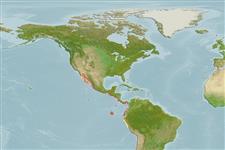>
Eupercaria/misc (Various families in series Eupercaria) >
Haemulidae (Grunts) > Haemulinae
Etymology: Haemulopsis: Greek, haimaleos = bloody + Greek, opsis = with appearance (Ref. 45335).
More on author: Steindachner.
Environment: milieu / climate zone / depth range / distribution range
पारिस्थितिकी
समुद्री ड़िमरसल. Tropical; 32°N - 12°S, 115°W - 77°W
Eastern Pacific: Gulf of California to Peru.
आकार / वज़न / Age
Maturity: Lm ? range ? - ? cm
Max length : 30.0 cm TL पुल्लिंग / अलिंग; (Ref. 9114); common length : 25.0 cm TL पुल्लिंग / अलिंग; (Ref. 9114)
Body robust, compressed, and not very deep (depth contained 2.7 to 3.3 times in standard length); mouth small and terminal, its posterior end located at the same level as the anterior rim of the eye; first gill arch with 17 to 20 gill rakers; dorsal fin notched, with 12 spines ad 14 to 15 soft rays (XII, 14-15); second anal spine shorter than third; body silvery bronzed; scales dark edged, forming longitudinal lines along each series of scales; anterior end of lateral line with an indistinct spot (Ref. 55763).
Inhabits coastal seas, on sandy or muddy bottoms. Marketed fresh (Ref. 9114).
Life cycle and mating behavior
परिपक्व अवधि | पुनरुत्पत्ति | मछलीऔ का अंडे देना | अंडे | Fecundity | लार्वा
Oviparous, distinct pairing during breeding (Ref. 205).
McKay, R.J. and M. Schneider, 1995. Haemulidae. Burros, corocoros, chulas, gallinazos, roncos. p. 1136-1173. In W. Fischer, F. Krupp, W. Schneider, C. Sommer, K.E. Carpenter and V. Niem (eds.) Guia FAO para Identification de Especies para lo Fines de la Pesca. Pacifico Centro-Oriental. 3 Vols. FAO, Rome. (Ref. 9114)
IUCN Red List Status (Ref. 130435: Version 2024-1)
Threat to humans
Harmless
Human uses
मात्स्यिकी: निर्वाह मात्स्यिकी
साधन
Special reports
Download XML
इंटरनेट स्रोत
Estimates based on models
Preferred temperature (Ref.
123201): 20.3 - 28.4, mean 24.9 °C (based on 72 cells).
Phylogenetic diversity index (Ref.
82804): PD
50 = 0.5312 [Uniqueness, from 0.5 = low to 2.0 = high].
Bayesian length-weight: a=0.01380 (0.00871 - 0.02187), b=2.89 (2.76 - 3.02), in cm total length, based on LWR estimates for this species & Genus-body shape (Ref.
93245).
Trophic level (Ref.
69278): 3.4 ±0.4 se; based on size and trophs of closest relatives
लौटाव (Ref.
120179): माध्यम, न्यूनतम जनसंख्या दुगनी होने का समय 1.4 - 4.4 वर्ष। (Preliminary K or Fecundity.).
Fishing Vulnerability (Ref.
59153): Low vulnerability (20 of 100).
Nutrients (Ref.
124155): Calcium = 159 [34, 317] mg/100g; Iron = 1.15 [0.59, 2.22] mg/100g; Protein = 18.5 [16.6, 20.3] %; Omega3 = 0.232 [0.120, 0.405] g/100g; Selenium = 46.1 [25.5, 86.6] μg/100g; VitaminA = 25.2 [10.1, 59.6] μg/100g; Zinc = 1.23 [0.87, 1.75] mg/100g (wet weight);
